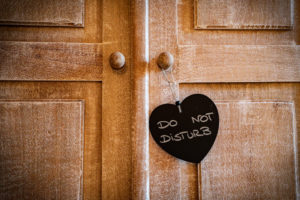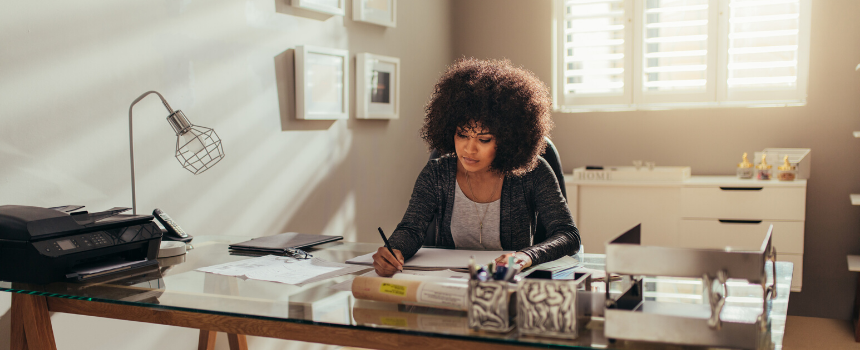As more and more people are working from home either by choice or mandated due to the current Coronavirus outbreak, I thought it would be worthwhile to share some best practices around how to do it effectively. At Pipeliner we have a mix of office and remote workers and we have put a lot of thought and effort into making remote working the most efficient and productive it can be. So let me spare you some of the trial and error and shortcut you to remote work success!
#1 PREPARE AS IF YOU ARE GOING INTO THE OFFICE!

Get up at your normal time, jump in the shower and then get dressed in whatever attire you normally would wear at the office. Do not succumb to the temptation to roll out of bed in your pajamas and start working. If you do, you are starting your day with an energy deficit and with the wrong mindset.
Also, resist putting on sweats or your favorite old t-shirt because both are synonymous with relaxation and downtime – again you are setting up a conflict in your brain between work and leisure which will result in a productivity decline. Discipline is key to success so dress like you care about your job.
#2 FIND SOMEWHERE UNCLUTTERED & DISTRACTION-FREE TO WORK

Nowadays many people have a dedicated in-home office so obviously this is the best place to work remotely from. Just make sure it is uncluttered and properly set up to work in. If you don’t have this luxury then be careful in your choice of location. The kitchen is rarely the best place because of the lure of a non-stop supply of goodies (not good for your health or your focus) plus if there are other people in the house it is often a high traffic location.
Your family room may not be a good place either due to the TV being there and the temptation to have it on (even muted) can be too much and ultimately will distract. Plus again it can be a high traffic location or one that you psychologically associated with kicking back. Ideally, find some room or space that has few distractions, is not likely to attract other family members and where you can isolate yourself as much as possible.
#3 TELL OTHERS & YOURSELF THAT YOU ARE NOT ON VACATION!!

It is vitally important that you tell other family members that you are WORKING from home and not on some informal, semi-vacation. You also need to tell yourself the same thing. This means that other people in the home should not disturb you (unless it is critical) and should respect the fact that you are being paid for your time.
You also need to impose the same discipline on yourself and resist the lure of unnecessary conversations or wandering the house to see what others are up to. Again the key is to treat working from home just as you would if you were in the office and your boss is sitting opposite you.
#4 SWITCH YOUR WEBCAM ON

Just because you are remote does not mean you have to be impersonal. This is another reason why you need to be showered, dressed and have a workspace that looks tidy. When you are talking to colleagues, customers, prospects, partners or whomever, it is good to be on camera at least some of the time. This humanizes the interaction and in no small way forces you to be presentable. It will also make you feel less isolated and more connected to others.
(If you are mumbling “I hate webcams, I don’t look good on them, I am nervous, I feel stupid” etc. my best advice to you is: GET OVER IT, THIS IS THE WORLD YOU LIVE IN & IT AIN”T CHANGING ANYTIME SOON!)
#5 BE AVAILABLE & OVER-COMMUNICATE

Human nature being what it is, there is often an underlying suspicion of those who work from home. Managers or colleagues may have an in-built bias or simply think the worst and assume you are abusing the circumstances. In other words, you are not really working hard or as much being at home – a total fallacy if you look at the research on remote and home working which proves that most people work harder and longer – plus you don’t lose the unproductive commute time.
But as I mentioned, human nature is what it is so the best way to mitigate against this is to make sure you are always available. If you use Skype, Slack or some other online communication tool, then make sure you visible as being available. Then if you are on a call or busy, mark yourself as such so people can see. If someone calls anyway during this time, let them know you are busy and will call them back. If you are taking a lunch break or any other time away from your desk, inform your boss at least and any other people you think should know. Proactive communication will eventually establish trust even in the most negative and suspicious of minds.
Oh and of course, deliver your work on time (or even sooner) and with the quality (or better) that you would have if you were in the office.
Working from home can be the greatest experience for both employee and employer when done correctly. It requires some adjustments from both sides but once established it has so many benefits that I will cover in a subsequent post.












Comments (5)
Good
PRECISE GOOD JOB
one of the best ways of working
This is the era where working from home is becoming an art
Anthony Constantinou says, “Either begin or end each day by preparing a clear to-do list of your work and project. Use online tool to manage your to do list. It will help you getting alerts and reminders into your outlook calendar or on your phone. This will keep your working in routine and keep you motivated towards your work.”